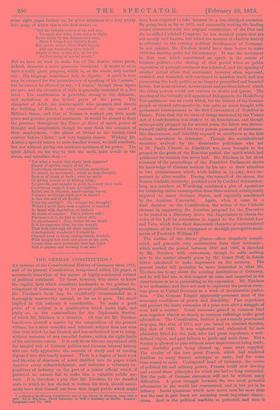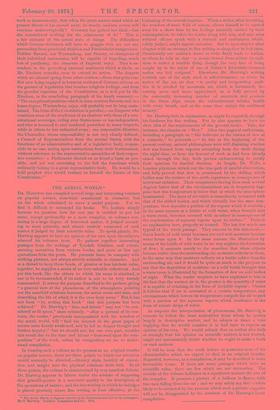THE GERMAN CONSTITUTION.*
AN epitome of the Constitutional History of Germany since 1815, and of its present Constitution, compressed within 124 pages, is necessarily somewhat of the nature of highly-condensed extract of political nutriment. To those, however, who desire to know the capital facts which constitute landmarks in the gradual de- velopment of Germany up to its present political configuration, Mr. Nicolson's book may be confidently recommended as a thoroughly trustworthy manual, as far as it goes. The merit implied in this estimate is considerable. To make a good précis of a subject is a qualification which ranks high, and justly so, in the examinations for the Diplomatic Service, of which Mr. Nicolson is a member. Of this art Mr. Nicolson has shown himself a master by the composition of the present volume, for a more complex and intricate subject does not exist than that which he has treated, and has understood how to bring, without omission of any essential feature, within the tight limits of his miniature canvas. It is only those who are acquainted with the tangled web of German politics and German internal history who can fully appreciate the amount of study and of reading digested into this handy manual. There is a degree of hard work and likewise of clearness of mind distilled into its pages which deserves every acknowledgment, and indicates a voluntary ex- penditure of industry on the part of a junior official which, if persisted in, cannot fail to make him a valuable public ser- vant. It is, therefore, a pity that Mr. Nicolson, by the dwarfed scale to which he has elected to reduce his work, should neces- sarily have shut himself out from that larger public which might • A Sketch of the German Constittdion and of the Events in Germany from 1815 to 1871. By A. Nicolson, Third Secretary in H.M.'s Embasay at Berlin. London : Longmana and Co. 1875. have been expected to take interest in a less abridged narrative. By going back as far as 1815, and summarily reciting the leading events connected with the original constitution of the Diet and the so-called Carlsbad Congress, he has touched points that are not merely well known, but which are matters of obsolete history- in reference to the existing political development of Germany. In our opinion, Mr. Nicolson would have done better to make 1848 the starting-point for his summary. It was the movement in that year which constituted an epoch in the course of German politics,—the closing of that period when no public expression of national sentiment was tolerated, and the opening of another period when that sentiment, however often repressed, violated, and wounded, still continued to manifest itself, and was permeating the body politic as no longer a proscribed and branded heresy, but as an element, inconvenient and perilous indeed, which the ruling powers could not venture to deride and ignore. The meeting of the virtually self-appointed Delegates in the Heidelberg Vor-parlament was an event which, for the history o the German people as viewed retrospectively, was quite as much fraught with permanent consequences as the first Convocation of Notables in France. From that day the state of things instituted by the Vienna Act of Confederation was shaken to its foundations, and though subsequently propped up for several years, the fabric was thence- forward visibly shattered for every person possessed of statesman- like discernment, and infallibly exposed to overthrow at the first serious convulsion in Germany. Though the constitutional structure evolved by the doctrinaire politicians who sat in St. Paul's Church in Frankfort was soon brought to the ground in the gaga of the Reaction period, the spirit which had quickened its creation was never laid. Mr. Nicolson in his short summary of the proceedings of the Frankfort Parliament shows his knowledge of German matters by his care to draw attention to two circumstances which, while hidden in by-play, were im- portant in after-results. During the turmoil of the storm, the Roman Catholic hierarchy, presided over by Cardinal Schwartzen- berg, in a conclave at Wurzburg, combined a plan of operations for obtaining entire emancipation from State control, subsequently acquired in many German States, and especially sanctioned
by the Austrian Concordat. Again, when it came to a final decision on the Constitution, the action of the Catholic element in supporting the Austrian proposal for the Executive to be vested in a Directory drove the Imperialists to obtain the votes of the Left by concessions in regard to the Electoral Law and Veto, which from their democratic character at once rendered acceptance of the Crown repugnant to the high-prerogative senti- ments of Frederick William IV.
The outline of the divers phases—often singularly compli- cated, and generally very. unattractive from their intricacy— which marked the period between 1850 and 1866, is sketched by Mr. Nicolson with correctness, though he adds nothing new to the matter already given by Mr. Grant Duff, in details better calculated to make impression on the memory. The general reader will probably be more interested in what Mr. Nicolson has to say about the existing institutions of Germany, and he will find him in this chapter as calm and impartial in his observations as he is painstaking in his exposition. Mr. Nicolson is no enthusiast, and does not seek to represent the present struc- ture given to United Germany as a work of invulnerable perfec- tion. _" The German Empire apparently possesses most of the necessary conditions of power and durability. Past experience will prevent the hasty surrender of a prize won after a struggle of over half a century. Great successes gained in common bind men together almost as closely as common sufferings under great adversities. The Constitution, further, is not a merely provisional stop-gap, like that of 1815, nor one based on abstract theories, like that of 1849. It was originated and elaborated by men admirably fitted for the task, who had great experience, a well- defined object, and past failures to guide and warn them. Not a Session is allowed to pass without some improvement being made, some doubtful point being cleared up, some want supplied. The rivalry of the two great Powers, which had rendered fruitless so many former attempts at unity, had for some time ceased to exist. Undisputed head of Germany, the centre of political life and military power, Prussia could now develop and extend those principles for which she had so long contended.
But the path of German statesmen will not be without many difficulties. A great struggle between the two most powerful adversaries in the world has commenced, and is but yet in its infancy. Social questions which now move men far more than was the case in past times are assuming most important dimen- sions. And is the political machine so perfected, and does it
work so harmoniously, that when the great master-mind which at present directs it has passed away, its steady, uniform action will continue uninterruptedly ? Germany has gained her ideal,—has she surrendered nothing for the attainment of it?" This is a fair estimate of the actual state of things. The difficulties which German statesmen will have to grapple with are not any proceeding from provincial rivalries and Particularist antagonisms. Neither Bavaria, nor Wurtemberg, nor Saxony, as champions of their individual autonomies, will be capable of impeding, much less of paralysing, the elements of Imperial unity. That is as- cendant in the pervading national sentiment which is likely, as Mr. Nicolson remarks, even to extend its action. The dangers which are abroad spring from other sources,—from that grim con- flict now being engaged in between sections of German citizens on the ground of legislation that touches religious feelings, and from the peculiar organism of the Constitution, as is well put by Mr. Nicolson, in the concluding paragraph of his handy summary:— " The exceptional positions which in some matters Bavaria and, in a lesser degree, Wurtemberg enjoy, will probably not be long main- tained. The form of the Constitution is peculiar,—an Emperor who combined some of the attributes of an absolute with those of a con- stitutional sovereign, ruling over States more or less independent, and who is hemmed in and rendered powerless in many respects, while in others he has unlimited scope ; one responsible Minister, the Chancellor, whose- responsibility is not very clearly defined ; a Council of Representatives from the several States, with the functions of an administrative and of a legislative body, respon- sible to no one, acting upon instructions from their Government, without reference to the representative assemblies of their respec- tive countries ; a Parliament elected on as broad a basis as pos- sible, and yet not exercising to the full the functions which ordinarily belong to a great representative body. He would be a bold prophet who would venture to foretell the future of this Constitution !"



































 Previous page
Previous page